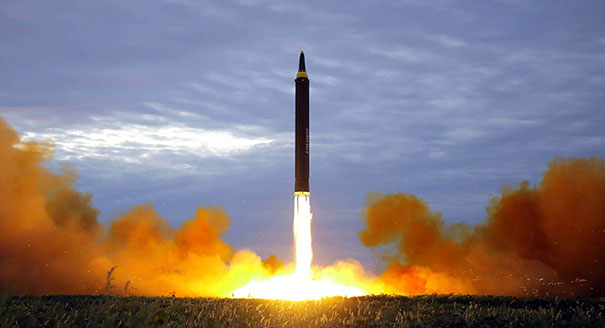The U.S.-North Korean nuclear standoff and how it is resolved will have global repercussions. Of particular importance is how the various potential outcomes over the next several years will affect nuclear non-proliferation and prospects for conflict and cooperation in the Middle East.
President Donald Trump’s handling of the North Korean nuclear crisis and the United States’ treatment of its South Korean and Japanese allies is likely to significantly affect how Israel, Saudi Arabia, and Iran assess their own positions vis-à-vis Washington, and each other, regardless of the final disposition of the nuclear deal with Iran. The United States lacks formal treaty commitments in the Middle East of the type it has with Japan and South Korea. But it has provided security assurances of various kinds to the Gulf Arab monarchies. And more important is the political commitment that successive U.S. administrations have made to Israel’s security, with widespread support—and even pressure—from Congress.
Like South Korea and Japan, U.S. security partners in the Middle East, from Israel to Egypt to the Gulf Cooperation Council states, depend in varying degrees on U.S. military support, such as intelligence sharing, training, logistics support, and the protection of critical infrastructure for their security. And like South Korea and Japan, Israel and the Gulf states are all buffeted by the maneuvering of outside powers—the United States, China, and Russia—for geopolitical advantage.
Thus, the outcome of the conflict with North Korea will be studied closely in the Middle East for clues about how the Trump administration responds to crises and deals with allies and adversaries. Four aspects of the U.S.-North Korean crisis will be of particular interest to America’s Middle East partners:
- What price would Washington be prepared to pay for a denuclearized North Korea or stringent constraints on its nuclear weapons and ballistic missile programs?
- How successful will the Trump administration be in rallying international pressure, particularly from Russia and China, against Pyongyang?
- How would the United States defend critical facilities in, and maintain the credibility of its extended deterrent over, South Korea and Japan as North Korea acquires the capability to hit American cities with thermonuclear weapons?
- How willing is the United States to deploy additional U.S. strategic assets (to possibly include tactical nuclear weapons) on South Korean territory?
The prospects for a diplomatic settlement to the North Korean problem appear remote. Nonetheless, strategists in the Middle East will carefully analyze the political, security, and economic concessions the United States, South Korea, Japan, China, and Russia might consider providing as a part of an incremental process of constraining Pyongyang’s nuclear and missile programs. Even in the absence of a settlement, what would the U.S. expect Kim Jong Un to give up and what would he receive in return? Saudi Arabia and Israel will be especially interested in how U.S. security commitments to Japan, and especially South Korea, factor into Washington’s approach.
America’s Middle East partners, like South Korea, face growing threats of missile attacks against densely populated areas over short distances. A potential conventional conflict on the Korean peninsula offers certain parallels to a possible next Israel-Hezbollah war, in which thousands, or even tens of thousands, of rockets and missiles (some of them copies of North Korean models) target Israel. Given its small size and advanced critical infrastructure, Israel is particularly vulnerable to precision weapons deployed by Hezbollah in population centers near its borders.
In the event of armed conflict on the Korean peninsula, the Trump administration’s response to South Korean and Japanese calls for military support and advanced weapons and equipment would be seen as a bellwether of its commitment to Seoul’s and Tokyo’s security, with significant implications for Middle Eastern countries.
The likeliest outcome of the North Korean standoff—and the one that most resembles the emerging posture between the United States and Iran—is a situation of neither war nor peace, which freezes the Korean peninsula into a sustained period of military and diplomatic tension. It would in some ways resemble a far more dangerous version of the Persian Gulf before the 2013 interim nuclear agreement with Iran defused tensions and created diplomatic momentum that resulted in the Joint Comprehensive Plan of Action (JCPOA), as the Iran nuclear agreement is formally known, eighteen months later. How a sustained North Korean crisis unfolds will affect the behavior of the main players vis-à-vis Iran—including Saudi Arabia and Israel, and perhaps Iran itself.
A crisis of extended duration might detract U.S. attention from Iran and impede Washington’s ability to rally an international coalition against a less salient—and non-nuclear—Iranian threat. Moreover, America’s Middle Eastern allies and security partners, as they grapple with Iran’s continued testing of ballistic missiles, will take great interest in how the Trump administration responds to continued North Korean missile tests.
Equally important, in their eyes, is whether U.S. diplomatic efforts focus on removing or reducing the North Korean intercontinental ballistic missile (ICBM) threat to U.S. territory at the expense of curbing the threat that Pyongyang’s short-range ballistic missile and intermediate-range ballistic missiles already pose to Japan and South Korea. The one sure way of “decoupling” these allies from the United States would be a perception that Washington cut a deal with North Korea on its nuclear and ICBM testing programs that neglected these direct threats to their own security. Such an outcome would not sit well, either, with Israel and the Gulf states.
Middle East policy planners will certainly be watching how the debate over the JCPOA plays out in Washington over the days and weeks ahead. But they should also pay close attention to events in the Korean peninsula. The Trump administration’s ability to coordinate in a crisis, to capitalize on opportunities to defuse tensions, and to pressure China into taking a more active and productive role has important ramifications for allies and adversaries alike in the Gulf and Levant regions. So too does Washington’s risk tolerance in a game of high-stakes chicken with Pyongyang and its support for its East Asian allies’ concerns.






